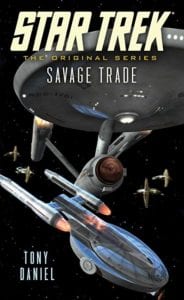
Shelf Unbound: Star Trek: The Original Series: Savage Trade reintroduces the Excalbians, first seen on television
in 1969 in season 3. Describe the Excalbians and why you chose to focus your novel on them.
Tony Daniel: The episode is called “The Savage Curtain.” The Excalbians were the aliens who turned themselves into Abraham Lincoln, Genghis Khan, and others, both evil and good. They are originally sort of, well, thinking rocky extrusions, I guess you might call them. The idea of the episode was that their species was highly advanced—more so than the Federation—yet had never needed a concept of good and evil. When the Enterprise
passes by, they read the crew’s minds and become intrigued with the concept of morality. So they snag Kirk, Spock, and the Enterprise crew (who are held hostage) to enact a rather barbaric drama pitting good against evil in a battle to the death.
My favorite aliens in Star Trek, any version, have been the ones who are not humanoid, but are something weird and wonderfully strange. My first Star Trek novel, Devil’s Bargain, featured the rocky, silicon-based Horta from the “Devil in the Dark” episode. I guess I like aliens that rock…or that are rocks!
Shelf Unbound: I’ve read that you were a big fan of the original Star Trek show. What’s one of your favorite episodes?
Daniel: Well, lots of writers will name the Harlan Ellison-penned “City on the Edge of Forever” as their choice for best. That one is great, but my true favorite is “The Paradise Syndrome,” the American Indian planet one, as goofy as it is in places. It has great stuff for Kirk and Spock to do that brings out their essential characters nicely. I also have a fondness for the episode featuring the traveling Shakespeare troop that contains a war criminal playing King Lear, “The Conscience of the King.” But there are so many great episodes. “Amok Time,” where Spock enters into his Vulcan rutting season, is a classic, too, and one of my favorites.
Shelf Unbound: With all the Trekkies out there analyzing and assessing everything Star Trek in person and on the Internet, is it intimidating to write a Star Trek novel, knowing that it will receive the fans’ rigorous scrutiny?
Daniel: Heck, yes. But it is my job to tell a great story and bring those characters to life, not to become a historian of the series in every particular. I do, however, have an incredibly knowledgeable editor in Margaret Clark who has forgotten more Trek data than I will ever know.
Shelf Unbound: You also write you own science fiction. How does your process differ in writing your own work versus writing a Star Trek piece?
Daniel: My aim is to entertain in whatever I write, so that’s the big picture. Writing a Star Trek novel is, in a way, like writing a traditional poem. There are certain structures you have to use or you’re simply not writing a sonnet or a sestina or whatever. I think having those restrictions for a story opens up new avenues of creativity—at least it does for me.
Shelf Unbound: Given that we’ve just lost Leonard Nimoy, let’s talk about Mr. Spock. What’s it like to write Spock? I imagine it would be kind of fun.
Daniel: Of course it’s a blast to write Spock, to imagine your way into that character, and to come up with ways to use Spock’s talents and limitations to tell a good story. Nimoy created the character as much with a raised eyebrow here, an acerbic intonation there, as did the writers of the series. He’ll live on in those performances, and in all his other excellent work.
